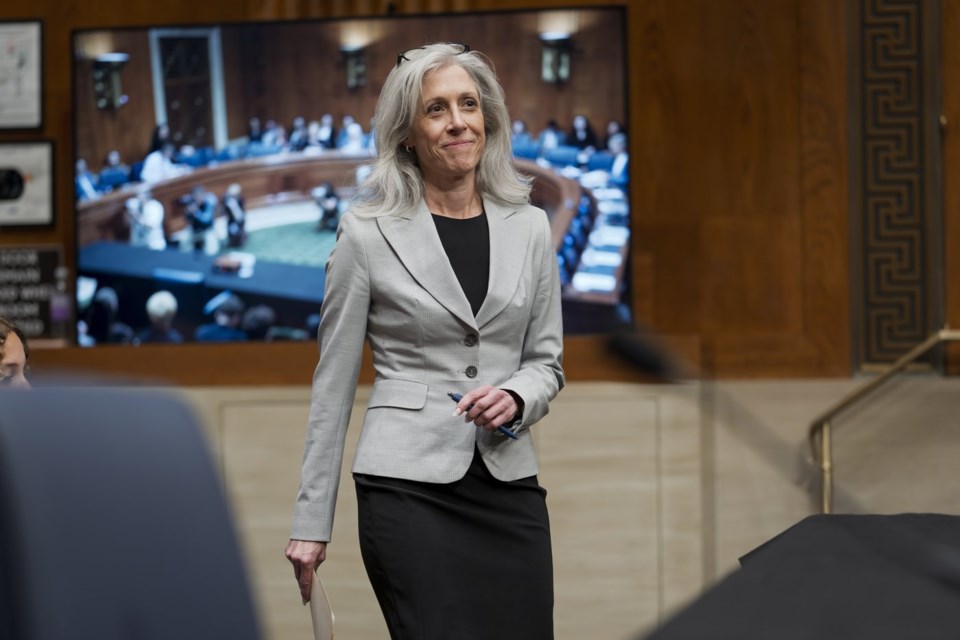NEW YORK (AP) — The director of the nation's top public health agency is out after less than one month in the job, and several top agency leaders have resigned.
“Susan Monarez is no longer director of the Centers for Disease Control and Prevention. We thank her for her dedicated service to the American people,” the U.S. Department of Health and Human Services wrote in a social media post Wednesday.
HHS officials did not explain why Monarez was no longer with the agency. Before the department’s late afternoon announcement, she told The Associated Press: “I can’t comment.”
Her departure coincided with the resignations of at least three top CDC officials. The list includes Dr. Debra Houry, the agency's deputy director; Dr. Daniel Jernigan, head of the agency's National Center for Emerging and Zoonotic Infectious Diseases; and Dr. Demetre Daskalakis, head of its National Center for Immunization and Respiratory Diseases.
In an email seen by an AP reporter, Houry lamented the crippling effects on the agency from planned budget cuts, reorganization plans and firings.
“I am committed to protecting the public's health, but the ongoing changes prevent me from continuing in my job as a leader of the agency,” she wrote.
She also noted the rise of misinformation about vaccines during the current Trump administration, and alluded to new limits on CDC communications.
“For the good of the nation and the world, the science at CDC should never be censored or subject to political pauses or interpretations,” she wrote.
In a different email, Daskalakis wrote: “I am no longer able to serve in this role any longer because of the ongoing weaponization of public health.”
Some public health experts decried the exodus.
“The loss of experienced, world-class infectious disease experts at CDC is directly related to the failed leadership of extremists currently in charge of the Department of Health and Human Services,” said Michael Osterholm, a University of Minnesota infectious disease researcher.
“These departures are a serious loss for America. They make our country less safe and less prepared for public health emergencies,” he said.
Monarez, 50, was the agency's 21st director and the first to pass through Senate confirmation following a 2023 law. She was named acting director in January and then tapped as the nominee in March after Trump abruptly withdrew his first choice, David Weldon.
She was sworn in on July 31 — less than a month ago, making her the shortest-serving CDC director in the history of the 79-year-old agency.
Her short time at CDC was tumultuous. On Aug. 8, at the end of her first full week on the job, a Georgia man opened fire from a spot at a pharmacy across the street from CDC’s main entrance. The 30-year-old man blamed the COVID-19 vaccine for making him depressed and suicidal. He killed a police officer and fired more than 180 shots into CDC buildings before killing himself.
No one at CDC was injured, but it shell-shocked a staff that already had low morale from other recent changes.
The Atlanta-based federal agency was initially founded to prevent the spread of malaria in the U.S. Its mission was later expanded, and it gradually became a global leader on infectious and chronic diseases and a go-to source of health information.
This year it’s been hit by widespread staff cuts, resignations of key officials and heated controversy over long-standing CDC vaccine policies upended by Health Secretary Robert F. Kennedy Jr.
During her Senate confirmation process, Monarez told senators that she values vaccines, public health interventions and rigorous scientific evidence. But she largely dodged questions about whether those positions put her at odds with Kennedy, a longtime vaccine skeptic who has criticized and sought to dismantle some of the agency’s previous protocols and decisions.
The Washington Post first reported she was ousted, citing unnamed sources within the Trump administration.
___
AP reporter Amanda Seitz in Washington contributed to this report.
___
The Associated Press Health and Science Department receives support from the Howard Hughes Medical Institute’s Department of Science Education and the Robert Wood Johnson Foundation. The AP is solely responsible for all content.
Mike Stobbe, The Associated Press



